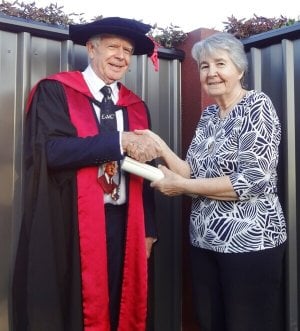So You Want To Be A Doctor?
- Replies 8
Note from the Editor:
This article was kindly written for the SDC by member @Doctor Alan.
Well, I’m not talking about being a GP – that would take years of study, and in retirement, it’s probably not such a good idea. Have you ever wished, though, that you could put the letters ‘Doctor’ before your name? You will need to allocate your time, and as we get older, we can spend many hours fulfilling a long-held dream. Of course, the underlying reason for embarking upon a postgraduate degree should be to offer a contribution to our society. You may want the Doctorate for a number of reasons. It could be that you feel a PhD would give you a higher social status, or you may just want to impress or inspire your children or grandchildren. Whatever the reason, I’ll tell you my story, and you may be surprised at how relatively easy it is – and with no cost – if you qualify! All you need is tenacity!
Cost:
I received a leaflet in my inbox when I was working as a ‘Facilitator’ at a Trades College in WA around 2011, offering ‘Fee-free PhDs’. A University would consider you for a PhD if you already had certain graduate qualifications and were an Australian Citizen and resident. I have recently completed a search on this subject, and it appears that certain universities offer scholarships to eligible students, but the offer of an entirely ‘fee-free’ PhD seems rather elusive, and you’d need to check with your State Universities to see if this option is still available. If not, the tuition fees can be deferred but appear to be quite substantial. I appear to have been very lucky.
Preparation:
One would think that a PhD could be completed for any subject in which you had an interest or felt there was a need to investigate. After I found that I’d been accepted by Curtin University in WA, I came up with a number of ideas that I honestly thought could be investigated, such as: ‘The Origin of the Moon’; ‘The Economic and Environmental Viability of Storing Nuclear Waste on the Dark Side of the Moon’; The Importance of Rapport Between Teacher and Pupil in the Classroom’; ‘The Positive Effect of Asian Cohorts on Results in an Australian School’ – and so on. All of these were turned down for one reason or another. (The last one was based on my own experience, but the university tutor did not believe it to be the case.) I found that for a particular subject to be accepted, a tutor had to be found with prior knowledge of the subject. Most theses have a section including the open door for further work in the same area. Nobody had studied the Moon, for instance.
The First Three Years:
The first year of the Doctorate was based on coursework. I had to complete a number of subjects and gain satisfactory results before I could move on. I think this year was equivalent to gaining a Master’s degree – I was admitted to the program based on my Bachelor of Engineering degree gained at the University of Technology in around 1985. Luckily, I had graduated with Honours.
The second year was spent arriving at a subject (‘Student Motivation’) for the thesis that was acceptable to the tutor who had been ‘allocated’ to me. There were many meetings and forms to fill in – hoops to jump through – and software to include based on the subject.
The third year made it clear that the previous year was mostly a waste of time. The tutor was changed, and the new tutor, Professor David Treagust, did not consider the subject I had chosen as ‘suitable’. In order to gain ‘Candidacy’, one had to have the subject ‘approved’. After a long meeting, we arrived at a new subject: ‘The Rise and Fall of an Australian Technical College Program’. I had been working at the Australian Technical College in South Perth (one of 24 throughout Australia established by the Government led by John Howard) for several years, and in 2013, after the withdrawal of funding by the Labor Government led by Julia Gillard, the colleges were all closed – ours had struggled on bravely for a while, but the outcome was inevitable. All the best people on the staff had ‘jumped ship’, and I had resigned and retired about three months before the college closed.
The Hard Slog:
The new subject involved tracing education back to the arrival of the First Fleet, the assimilation of convicts with consequent class distinction and so on. It was clear from the outset that my new tutor had very definite ideas about how a thesis should be written, and a lot of time was spent making sure I complied with his direction; after all, he was the one who would have to approve it in the first instance. It’s quite hard to believe, but the next four years were taken up with making sure the format of my thesis, the language in which it was written (‘academic-speak’), the grammar and so on was consistent with my tutor’s requirements. I likened it to the times I spent acting in local dramas – the Director must be obeyed! There were several trips to the University of Queensland to borrow books for reference, a plethora of online publications from which to download quotes and texts, and very frequent emails to and from Professor Treagust. (We had moved to Queensland by this time and the whole thesis was created remotely from Curtin University in WA.)
The Light at The End of the Tunnel:
In March 2018, after a lot of agonising, I made a decision to give up on the thesis after all. The problems trying to comply with the minutiae of instructions and format changes had become a huge burden. Luckily, after receiving my ‘termination’ email, the tutor managed to persuade me to continue, and I came ‘out of the tunnel’ of despair to continue for one last effort. It was a pivotal moment when I suddenly realised what the tutor had been asking me to do regarding the important steps in the historical aspect of the thesis. I suppose it was one of those times when one sits back and suddenly sees the ‘big picture’, like a revelation. On December 4th of 2019, after submitting ‘Final Drafts’ and numerous forms, and after approval by a panel chosen by the tutor, my thesis was approved, and I was granted the title ‘Doctor of Science Education’. At that point, I was certainly very glad I hadn’t been allowed to ‘give up’ after so many years of effort.
Final Thoughts:
When I look back over the years – and luckily, I keep a very comprehensive diary – it does appear that the thesis could so easily have been completed at least three years earlier. I was very lucky to have a very understanding wife and, in the end, to be able to devote so much of my time to the task. I had retired at 69 years old, so I’d ‘done my bit’ for the country. I felt – and feel – very lucky to have had the opportunity given to me, both for the post-graduate degree and the undergraduate Bachelor's degree, at no cost, thanks to various Government initiatives.
Australia: the ‘Lucky Country’ indeed!
About the author: Having spent three years living in Australia in his youth, Alan returned to Australia in 1969 with his wife and young child. Holding a Bachelor of Engineering degree and a Doctor of Science Education degree, Alan has experience in flight simulations, Einsteinian physics, and inventing an ‘eye blink’ device that allows cerebral palsy patients to communicate. He even took a turn at acting, starring in a TV advert and landing supporting and lead roles in his local dramatic society plays. His short stories have been published in WA’s The Gingin Buzz for ten years, and his novel The Magic Hourglass is a work in progress. He and his wife have a lovely life in Brisbane and regularly visit their two children in Sydney’s West. You can read Alan’s full-length bio here.
Note from the Editor:
Are you interested in pursuing further tertiary education? Maybe you’re already undertaking a TAFE course, Masters or Doctorate degree. We’d love to hear from you!
You might also like to read:
Finding a Part-Time Job
My First Love Affair
Alan G.’s Member Spotlight: ‘Almost Famous’
We were only able to create this content because of the financial support of SDC Rewards members. If you'd like to see more of this (and a lot fewer ads!), please consider supporting us and signing up for SDC Rewards today—it starts at just 14 cents per day.










